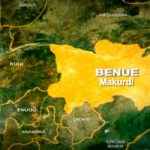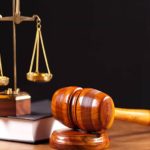Looting of N1Trillion Recovered Funds: Lamorde Has Case to Answer – Senate
 Former Chairman of the Economic and Financial Crimes Commission (EFCC) Ibrahim Larmorde, must appear before the Senate to answer to allegation against him that he superintend the looting of recovered funds; if he is clean, he has no reason to stay away because only the guilty are afraid; a Senator and member of the Ethics Committee told our reporter.
Former Chairman of the Economic and Financial Crimes Commission (EFCC) Ibrahim Larmorde, must appear before the Senate to answer to allegation against him that he superintend the looting of recovered funds; if he is clean, he has no reason to stay away because only the guilty are afraid; a Senator and member of the Ethics Committee told our reporter.
Lamorde had been shunning summons from the Senate to answer to charges contained in a petition of how he diverted recovered monies rather than returning same to their original owners.
Last week, while considering the report of the Committee on Ethics Privileges and Public Petitions, the Senate directed the committee to request the warrant at the committee level.
Larmode had in October 2015, been petitioned by one Mr George Uboh for allegedly diverting about one trillion Naira from the EFCC.
The Committee had sought the Senate to adopt its resolution seeking that Larmorde be arrested and compelled to appear before it having shunned three summons by the Committee in 2015.
The Committee Chairman Mr. Sam Anyanwu (PDP Imo East) had recommended that to save the face of the Senate and conserve its powers to summon, Larmorde should be arrested.
“The Committee, having waited in vain for the appearance of Mr. Ibrahim Larmode since 24th November 2015 it was forced to conclude that he wants to evade investigation.
“The only way to get the former EFCC Chairman to appear before the Committee was to invoke the powers of the senate in section 89 (1C and D) of the 1999 Constitution.
“The committee is convinced that unless this line of action was taken, the National Assembly might be drawn into consequential disrepute in the future,” he stated.
Anyanwu recommended that a warrant of arrest be issued by the Senate for the arrest of Larmorde.
Also relying on a Point of Order, the Deputy President of the Senate, Ike Ekweremadu reminded the Committee that the constitution had given it power to request the arrest of anyone.
He said that the issuing of a warrant of arrest was not subject to the resolution of the entire house as section 89 of the 1999 Constitution gave the committee power to request the arrest.
Ekweremadu added that section 89(4) also give the Committee the power to ensure that the person being arrested is made to pay whatever the cost of arresting him is.
“The committee can impose such fines that may be prescribed for any such failure and it shall be recoverable in the same manner as a fine imposed by a court of law.
“The warrant issued under this section may be served or executed by any member of the Nigerian Police Force or by any person authorized by the President of the Senate or the Speaker of the House of Representatives as the case may be.
“So what is required here is for the committee to issue a warrant of arrest and then the President of the Senate will direct the Police to effect the arrest.
“It is not the business of the senate during the plenary to do so otherwise we will be offending this part of the constitution.
“So the issue of warrant of arrest is not something that we will take a resolution on, the resolution has already been taken by the committee.
“If there is any consequential order that needs to be made, the committee can deal with that and direct it through the Office of the President of the Senate who will direct the Police to effect the warrant,” Ekweremadu said.
In his remark, Senate President Bukola Saraki, upheld Ekweremadu’s Point of Order, stressing that the request for a warrant should not have come to plenary in the first place.
“The issue has been well spelt out by the DSP, based on the constitution this matter does not need to come to us at plenary.
“It should be left at the level of the committee and in accordance with section 89 of the Constitution, so I will sustain the point of order of the DSP,” he said.
While itemising some of the allegations against the former EFCC boss, Sam Anyanwu said that the EFCC did not reflect all recovered funds.
“That the EFCC doctors and manipulates bank accounts to conceal diversion of fund: That EFCC releases recovered funds to unidentified persons and EFCC officials.
“That EFCC moves fund from its recovery accounts to EFCC operations accounts from where it diverts same: That EFCC trades with recovered funds through bank deposits and placements.
“That over 95 per cent of EFCC’s recoveries in foreign currencies, other than those from multinational companies has been diverted.
“That EFCC colludes with real estate companies in order to grossly undervalue seized assets before they are sold to their cronies
“That EFCC has not accounted for offshore recoveries: That over half of the assets seized from suspects were not reflected in EFCC exhibit records,” Anyanwu said.
Recall that on Dec. 13, 2012, the Senate issued its first warrant of arrest on the head of pension reform task team, Abdulrasheed Maina.
Maina had refused to appear before the Senate Joint Committee on Establishment and States and Local Government Administration which was investigating alleged mismanagement of pension funds to the tune of N195 billion.








